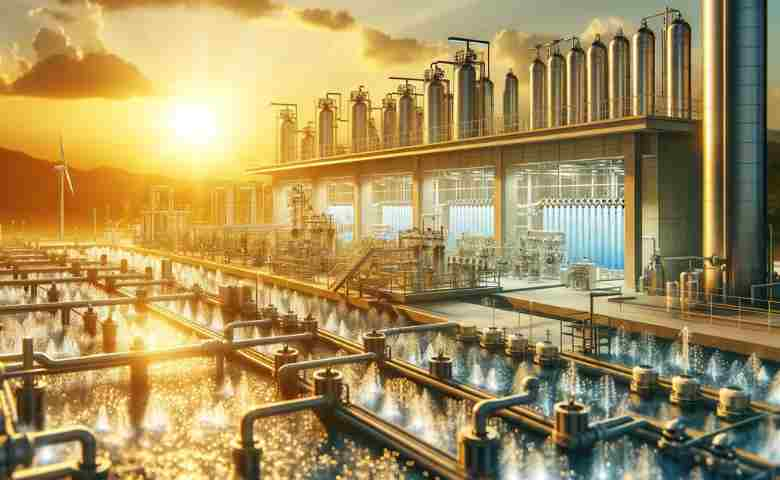Last Updated on February 27, 2024 by Admin
Water is an essential resource for all living beings, and proper management of water and wastewater is crucial for the well-being and sustainable development of our society. In recent years, there has been a growing recognition of the importance of innovative solutions in water and wastewater management. From addressing the challenges in current wastewater solutions to technological advancements in water treatment and sustainable practices, this article explores the various aspects of innovative water and wastewater solutions.
Table of Contents
Understanding the Importance of Water and Wastewater Management
Water is a finite resource, and with the growing population and urbanization, it is necessary to manage it efficiently. The management of water includes the entire cycle, from extraction to treatment, distribution, use, and proper disposal of wastewater. Wastewater management is equally crucial as it plays a significant role in protecting our environment and ensuring public health.
Efficient water management is not only essential for meeting the current needs of society but also for preserving water resources for future generations. By implementing sustainable practices such as rainwater harvesting, water recycling, and implementing water-efficient technologies, communities can reduce their water footprint and minimize the strain on freshwater sources. Moreover, raising awareness about water conservation and promoting responsible water usage habits among individuals can contribute to a more sustainable water future.
The Role of Innovation in Water Management
Innovation is a driving force in addressing the challenges of water management. It involves the development and application of new technologies, processes, and practices to improve efficiency and effectiveness. Innovations in water management are essential for optimizing water resources, reducing water scarcity, and enhancing the resilience of water systems to cope with the changing environmental conditions.
Furthermore, the integration of smart water management systems, such as real-time monitoring devices, data analytics, and predictive modeling, can revolutionize the way water resources are managed. These technologies enable authorities to detect leaks, monitor water quality in real-time, and optimize water distribution networks, leading to improved operational efficiency and reduced water losses.
Challenges in Current Wastewater Solutions
Although significant progress has been made in wastewater treatment, there are still challenges that need to be addressed. The conventional wastewater treatment methods can be energy-intensive and produce sludge that requires proper disposal. Additionally, the lack of access to adequate sanitation facilities is a pressing issue in many developing countries, leading to waterborne diseases and environmental pollution. It is crucial to find innovative solutions to overcome these challenges.
One promising approach is the adoption of nature-based solutions for wastewater treatment, such as constructed wetlands and biofiltration systems. These eco-friendly methods mimic natural processes to treat wastewater effectively while minimizing energy consumption and chemical usage. By promoting the implementation of decentralized wastewater treatment systems and investing in infrastructure upgrades, communities can improve sanitation access, protect water resources, and enhance overall public health.
Related Course:
- Managing Major Engineering Projects
- Engineering of Structures: Tension
- Engineering: Building with Nature
- Engineering of Structures: Compression
Technological Advancements in Water Treatment
Recent technological advancements have revolutionized water treatment processes, making them more efficient, reliable, and sustainable. Two notable advancements include the rise of smart water networks and advanced filtration systems.
The Rise of Smart Water Networks
Smart water networks utilize sensors, data analytics, and advanced control systems to monitor and optimize water distribution networks. By continuously monitoring water quality, pressure, and usage, these networks can detect leaks, reduce water loss, and improve overall system efficiency. Implementing smart water networks can result in significant cost savings and promote sustainability.
Furthermore, smart water networks enable real-time monitoring and remote control of water treatment processes, allowing operators to respond promptly to changes in water quality or demand. This proactive approach enhances system resilience and reliability, ensuring uninterrupted water supply to communities even during unexpected events or emergencies.
Advanced Filtration Systems
Advanced filtration systems have emerged as a game-changer in water treatment. Membrane filtration technologies, such as reverse osmosis and nanofiltration, are capable of removing contaminants with exceptional precision, ensuring high-quality water supply. Moreover, these systems can be integrated into wastewater treatment plants to produce reclaimed water for non-potable reuse, reducing the strain on freshwater resources.
In addition to their contaminant removal capabilities, advanced filtration systems contribute to energy efficiency in water treatment processes. By utilizing innovative membrane materials and design enhancements, these systems require less energy to operate while maintaining high filtration performance. This energy-saving aspect not only reduces operational costs but also aligns with sustainability goals by lowering carbon emissions associated with water treatment.
Related Course:
- Ethics, Technology and Engineering
- Real-World Engineering Management
- Seismology to Earthquake Engineering
- Environmental Engineering: Drinking Water Treatment
Sustainable Practices in Water and Wastewater Management
Adopting sustainable practices in water and wastewater management is critical to minimize the environmental impact and ensure long-term water availability. It is essential to consider the interconnectedness of water resources, ecosystems, and human activities when developing strategies for sustainable water management.
One key aspect of sustainable water management is the protection of water quality. Contaminants from industrial, agricultural, and urban sources can degrade water quality, making it unsuitable for consumption and harmful to aquatic life. Implementing proper monitoring and treatment measures, such as filtration systems and chemical treatments, is crucial to maintaining water quality and safeguarding public health.
Water Conservation Techniques
Water conservation techniques play a vital role in reducing water demand. These techniques include implementing efficient irrigation systems, promoting water-efficient appliances, and adopting water-saving practices in households and industries. By conserving water, we can secure water resources for future generations and mitigate the effects of water scarcity. Additionally, investing in water reuse and recycling technologies can further enhance water conservation efforts and reduce the strain on freshwater sources.
Energy-Efficient Wastewater Treatment
Energy consumption in wastewater treatment plants can be significant due to the requirements of aeration, pumping, and sludge treatment processes. Energy-efficient wastewater treatment technologies, such as anaerobic digestion and co-generation, can help reduce energy consumption and even generate renewable energy as a byproduct. By optimizing energy usage, we can contribute to carbon footprint reduction and promote sustainable water management. Furthermore, incorporating natural treatment systems, such as constructed wetlands, into wastewater treatment processes can enhance treatment efficiency while minimizing energy inputs and operational costs.
Related Courses:
- Sustainable Transportation Networks and Streetscapes
- Transportation, Sustainable Buildings, Green Construction
- Introduction to air transportation and aviation management
- Smart Cities – Management of Smart Urban Infrastructures
Future Trends in Water and Wastewater Solutions
The future of water and wastewater solutions is expected to witness further advancements driven by emerging trends and challenges. As we look ahead, it becomes evident that the world of water management is poised for exciting developments that will shape the way we address the growing water crisis.
The Impact of Climate Change on Water Management
Climate change poses significant challenges to water management. Changing precipitation patterns, increased frequency of extreme weather events, and rising sea levels affect water availability and quality. The implications of these changes are far-reaching, impacting not only the availability of freshwater resources but also the delicate balance of ecosystems that depend on them.
Adaptation strategies are crucial to cope with these challenges. Developing climate-resilient water infrastructure becomes imperative to ensure the reliable supply of clean water to communities. Additionally, implementing sustainable water management plans that prioritize conservation and efficient use of water resources can help mitigate the impacts of climate change on water availability.
The Role of AI and IoT in Future Water Solutions
Artificial intelligence (AI) and the Internet of Things (IoT) have the potential to revolutionize water and wastewater management. These cutting-edge technologies offer innovative ways to monitor, analyze, and optimize water systems, leading to improved efficiency and sustainability.
AI algorithms can analyze large datasets and provide real-time insights for decision-making, optimizing water distribution, and predicting water quality. By harnessing the power of AI, water utilities can make informed decisions that maximize the use of available resources and minimize waste. This not only enhances operational efficiency but also reduces costs, making water management more economically viable.
In parallel, IoT-enabled sensors and devices can enhance system monitoring and enable remote management. These smart devices can collect real-time data on water quality, flow rates, and infrastructure performance, allowing for proactive maintenance and prompt response to any issues that may arise. By leveraging IoT technologies, water utilities can improve the reliability and resilience of their systems, ensuring a continuous supply of safe water to communities.
Related Course:
- Smart Cities – Management of Smart Urban Infrastructures
- Construction Project Management
- Application of AI, InsurTech, and Real Estate Technology
- Sustainable Cities and Communities
Final Reflections
In conclusion, innovative solutions play a crucial role in advancing water and wastewater management. Technological advancements, sustainable practices, and future trends all contribute to optimizing water resources, improving water quality, and ensuring the long-term sustainability of our water systems. By embracing innovation and implementing these solutions, we can create a more resilient and sustainable water future for generations to come.
Staying informed about the latest in water and wastewater solutions is crucial for both professionals and enthusiasts alike. The Environmental Protection Agency (EPA) offers resources and guidelines on water sustainability practices and technologies. For those interested in the technological side, Water Online provides news and analysis on water and wastewater industry trends and innovations. The World Water Council is another valuable resource, focusing on global water policy, sustainability, and management strategies. These resources offer comprehensive insights into the efforts and advancements being made in water sustainability and waste management.
Related Posts:
- Best Water Treatment and Water Technology Companies in India
- How to handle water scarcity during summer season in complex apartments?
- Septic Systems vs Sewers: Six Key Differences to Understand
- Career in Water Resource Management: Pathways, Roles, and Opportunities


